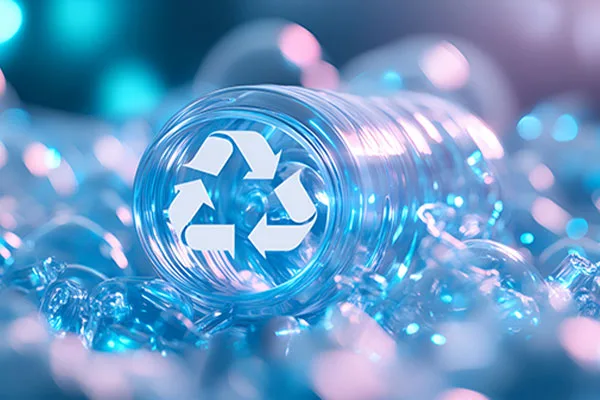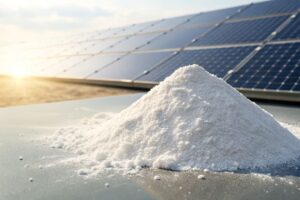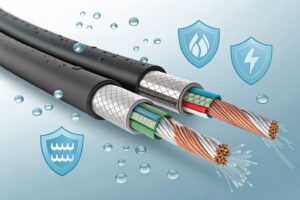Recycled PET (rPET) is rapidly gaining popularity as industries shift toward sustainable materials. One key aspect of rPET’s performance is its intrinsic viscosity (IV), a critical parameter that directly impacts the material’s mechanical and processing properties. In this blog, we’ll explore what IV means, its importance in plastics, and how chain extenders can improve rPET performance.
What is IV in Plastic?
Intrinsic Viscosity (IV) is a measure of a polymer’s molecular weight, reflecting the size and length of its polymer chains. It is determined by how the material’s molecules behave in a solution and is directly related to the strength, flexibility, and durability of the plastic.
For PET (polyethylene terephthalate) and rPET, the IV determines:
- Mechanical Strength: Higher IV often corresponds to stronger, more durable materials.
- Processability: IV influences melt viscosity, which impacts the material’s flow during processing methods like injection molding or extrusion.
- End-Use Applications: Different applications (e.g., beverage bottles, fibers, or films) require specific IV ranges to meet performance standards.
What is the Difference Between Viscosity and Intrinsic Viscosity?
Viscosity and intrinsic viscosity (IV) are both terms related to the flow and behavior of materials, but they describe different properties and apply to different contexts. Here’s a breakdown of the key differences:
Viscosity
- Definition: Viscosity measures a fluid’s resistance to flow when a force is applied. It describes how “thick” or “sticky” a fluid is.
- Context: Viscosity applies to liquids and polymer melts, such as honey, water, or molten plastic.
- Units: Typically expressed in Pascal-seconds (Pa·s) or centipoise (cP).
- Example: Honey has a higher viscosity than water because it flows more slowly when poured.
Intrinsic Viscosity (IV)
- Definition: Intrinsic viscosity measures how a polymer affects the viscosity of a solvent when dissolved, and it is directly related to the polymer’s molecular weight.
- Context: IV is specific to polymers, used to evaluate the size and length of polymer chains. It is a key property for materials like PET (polyethylene terephthalate) and rPET (recycled PET).
- Units: Expressed in deciliters per gram (dL/g).
- Example: A higher IV in PET indicates longer polymer chains, which translates to better mechanical properties and strength.
Key Differences
| Aspect | Viscosity | Intrinsic Viscosity (IV) |
| Scope | Applies to fluids and melts | Specific to polymers in solution |
| Measurement | Resistance to flow | Polymer’s contribution to solvent viscosity |
| Relevance | Impacts processing conditions | Reflects polymer molecular weight |
| Application Examples | Injection molding or extrusion | Assessing polymer strength and durability |
In summary, viscosity describes how a material flows under force, while intrinsic viscosity provides insight into the molecular structure and weight of polymers. Both are essential properties, but intrinsic viscosity is particularly important for understanding and optimizing polymer-based materials like PET and rPET.
Is Higher Viscosity Thicker or Thinner?
In simple terms:
- Higher viscosity usually means a material is thicker and flows more slowly, like honey.
- For PET and rPET, a higher IV typically results in better mechanical properties but may require higher temperatures or pressures during processing.
For recycling, maintaining a balanced IV is essential: low IV materials may lead to brittle or underperforming products, while excessively high IV can complicate processing.
How to Increase IV of PET?
The challenge with rPET is that the recycling process often degrades the polymer chains, reducing IV and weakening the material. This degradation occurs due to heat, moisture, and mechanical stresses during reprocessing. So, how can we restore or enhance the IV of rPET?
One effective solution is the use of chain extenders.
Chain Extenders: The Game-Changer for rPET IV
Chain extenders are reactive additives that link or rebuild polymer chains, improving molecular weight and IV. Here’s how they work:
- Rebuilding Molecular Chains: Chain extenders react with the end groups of degraded PET chains to form longer, more robust chains, effectively increasing IV.
- Improving Mechanical Properties: By enhancing chain length, the material regains its strength, flexibility, and impact resistance.
- Enhancing Processability: A balanced IV ensures that rPET flows optimally during processing without compromising quality.
Applications of Chain Extenders in rPET
- Bottle-to-Bottle Recycling: Achieving food-grade rPET requires restoring IV to meet safety and durability standards.
- Fiber Production: In textiles, higher IV improves the strength and elasticity of PET fibers.
- Engineering Plastics: Chain extenders help rPET compete with virgin PET in high-performance applications like automotive parts or electronics.
Why Choose Chain Extenders for rPET?
- Cost-Effectiveness: They reduce the need for blending rPET with expensive virgin PET.
- Sustainability: Extend the life cycle of PET, promoting circular economy practices.
- Efficiency: Easy to incorporate into existing recycling processes with minimal additional equipment.
Conclusion
Intrinsic Viscosity (IV) is a cornerstone property of PET and rPET, dictating material performance and processing viability. Chain extenders offer a practical, efficient solution for restoring or enhancing IV, enabling rPET to match or exceed the quality of virgin PET in various applications.
For businesses looking to optimize their use of rPET, understanding and leveraging chain extender technology is essential to achieving sustainability goals without compromising product performance.
Looking to improve the IV of your rPET? Contact us today to explore tailored chain extender solutions!







